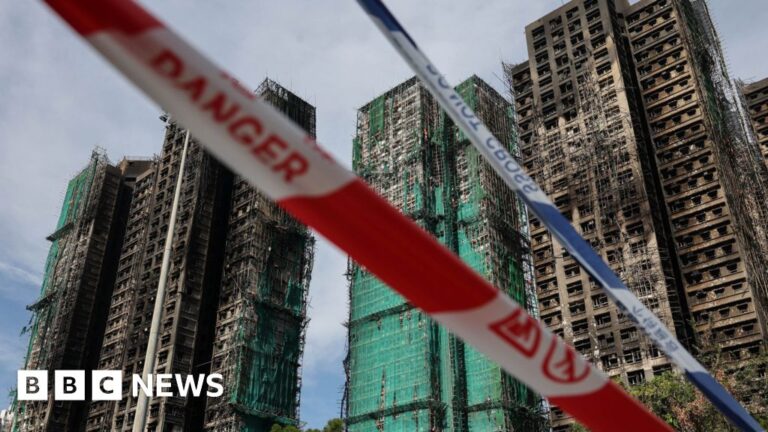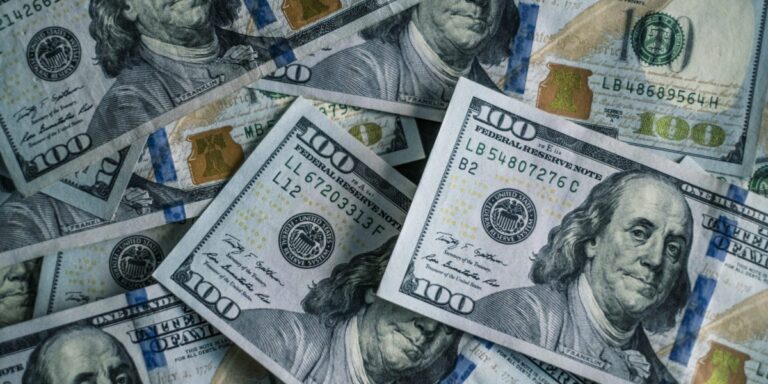
Deere stock rating reaffirmed at Buy by UBS on 2027 recovery outlook
UBS reaffirms Buy rating on Deere stock with positive outlook for 2027 recovery
Death toll in Hong Kong tower block fire climbs to 128
At least 128 people have died in a devastating fire that engulfed multiple high-rise buildings in Hong Kong.
A further 79 people have been injured in the city’s deadliest blaze in more than 70 years, which occurred in the northerly suburb of Tai Po, while dozens remain missing.
The tower blocks had been undergoing renovations when the fire began. The cause of the blaze remains unclear but officials said on Friday that Styrofoam placed on the outside of the windows facilitated its rapid spread.
Three people overseeing the renovations are under arrest for manslaughter, and authorities have launched a corruption inquiry.
Bringing the fire – which spread across seven of Wang Fuk Court’s eight apartment blocks – under control involved more than 2,311 firefighters.
Firefighting efforts have now ceased. The fire was fully extinguished by 10:18 local time (02:18 GMT) on Friday, the fire department said in a news conference.
It also said 89 bodies have yet to be identified, and 16 bodies remain inside the buildings.
Authorities said police will begin entering the Wang Fuk Court buildings on Friday to start gathering evidence, and that an investigation will take place over the next three to four weeks.
Meanwhile, crowds have been gathering at a nearby community hall that has been opened to families looking for missing loved ones. Relatives are being asked to help with the identification process by bringing in family photos.
The Hong Kong government has also set up shelters and support centres for displaced residents. Groups of volunteers have been packing and organising supplies for those affected, including clothing and hygiene products.
The blaze started at 14:51 local time (06:51 GMT) on Wednesday, and by 18:22 local time it had been upgraded to the most serious category by fire officials.
The fire department said the fire started at a lower level before moving upwards, and reached a peak temperature of 500C (932F).
As a result, the blaze reignited in some places after being doused, they said.
One former resident, who moved out earlier this year and only gave his surname, told the BBC: “There was nothing we could do. Together we watched our homes burn gradually.”
The fire spread quickly across the separate blocks due to the presence of flammable netting and other materials on the outside of the buildings.
Firefighter Ho Wai-ho, 37, has been identified as among those killed. He was found collapsed at the scene on Wednesday, about 30 minutes after contact with him was lost.
Twelve other firefighters have also been injured, authorities said.

Two Indonesian nationals who had been working on the buildings were also killed in the fire, a migrant charity said. Indonesian and Filipino workers are among those still unaccounted for.
Indonesian worker Fita had been inside the building with her employer when she heard the fire brigade siren. She described it as scary and confusing, but added that she felt “so grateful” to be safe.
“But I’m concerned about friends I know… Usually we talk, and then I haven’t met them [since the fire],” she told news agency Reuters.
Many of those in the shelters have been unwilling to speak to the media while reeling from the trauma.
Shock has quickly shifted to anger in Hong Kong, as questions grow on who should be held accountable for the blaze.
Several residents have said they did not hear a fire alarm when the fire broke out. Hong Kong’s fire service found that fire alarms in all eight blocks were not working effectively.
Meanwhile, one resident told the BBC that some of the alarms had been turned off by construction workers.
Reports of residents’ prior complaints over high renovation fees and whether the materials used complied with fire-safety regulations have also resurfaced and are circulating widely online.
“We have reason to believe that those in charge at the company were grossly negligent, which led to this accident and caused the fire to spread uncontrollably, resulting in major casualties,” a police spokesperson said.
Wang Fuk Court was built in 1983 and had provided 1,984 apartments for around 4,600 residents, according to a 2021 government census.
Nearly 40% of its residents are estimated to be at least 65 years old. Some have lived in the subsidised housing estate since it was built.
Hong Kong’s deadliest fire on record killed 176 people in 1948 and was caused by a ground-floor explosion at a five-storey warehouse.
Additional reporting by Martin Yip and Gemini Cheng in Hong Kong
Experts stress the significance of rebalancing your portfolio in today’s unpredictable market. Here’s a guide to help you begin:
If you’ve chosen a target asset allocation—the mix of stocks, bonds, and cash in your portfolio— you’re probably ahead of many investors. But unless you’re investing in a set-and-forget investment option like a target-date fund, your portfolio’s asset mix will shift as the market fluctuates. In a bull market you might get more equity exposure than you planned, or the reverse if the market declines.
Rebalancing involves selling assets that have appreciated the most and using the proceeds to shore up assets that have lagged. This brings your portfolio’s asset mix back into balance and enforces the discipline of selling high/buying low. Rebalancing doesn’t necessarily improve your portfolio’s returns, especially if it means selling asset classes that continue to perform well. But it can be an essential way to keep your portfolio’s risk profile from climbing too high.
Where and How to Rebalance
If it’s been a while since your last rebalance, your portfolio might be heavy on stocks and light on bonds. A portfolio that started at 60% stocks and 40% bonds 10 years ago could now hold more than 80% stocks.
Another area to check is the mix of international versus U.S. stocks. International stocks have led in 2025, but that followed a long run of outperformance for U.S. stocks, so your portfolio might lack international exposure. (Keeping about a third of your equity exposure outside the U.S. is reasonable if you want to align with Morningstar’s global market portfolio.)
Other imbalances might exist. Growth stocks have gained nearly twice as much as value stocks over the past three years. You might also be overweight in specialized assets such as gold and bitcoin thanks to their recent run-ups.
After assessing your allocations, decide where to make adjustments. You don’t need to rebalance every account—what matters is the overall portfolio’s asset mix, which determines your risk and return profile. It’s usually most tax-efficient to adjust within a tax-deferred account such as an IRA or 401(k), where trades won’t trigger realized capital gains. For example, if you’re overweight on U.S. stocks and light on international stocks, you could sell U.S. stocks and buy an international-stock fund in your 401(k).
If you need to make changes in a taxable account, you can attempt to offset any realized capital gains by selling holdings with unrealized losses. That might be difficult, as the strong market environment has lifted nearly every type of asset over the past 12 months. Only a few Morningstar Categories (including India equity, real estate, consumer defensive, and health care) posted losses over the trailing 12-month period ended Oct. 30, 2025. The average long-term government-bond fund lost about 8% per year for the trailing five-year period as of the same date, so those could offer opportunities for harvesting losses.
Required minimum distributions can also be used in tandem with rebalancing. Account owners have flexibility in which assets to sell to meet RMDs. If you own several different traditional IRAs, you could take the full RMD amount from any of them. Selling off holdings that appreciated the most can bring the portfolio’s asset mix back in line with your original targets.
Another option is funneling new contributions into underweight asset classes. Depending on the size of additional investments, this approach might take time, but it’s better than not rebalancing at all. This might also appeal if you’ve built up capital gains you don’t want to realize.
Final Thoughts
Rebalancing is especially important in extremely volatile times. But even in a more gradual bull market like in recent years, it’s important for keeping a portfolio’s risk level in check, especially for investors as they approach retirement and start spending their portfolios.
___
Copa Libertadores Final: Palmeiras and Flamengo to Face Off – Teams, Kickoff Time, and Starting Lineups | Soccer Updates
Who: Palmeiras and Flamengo
What: Copa Libertadores final
Where: Monumental Stadium, Lima in Peru
When: Saturday, November 29 at 4pm (21:00 GMT)
How to follow: We’ll have all the build-up on Al Jazeera Sport from 18:00 GMT in advance of our text commentary stream.
The recent Brazilian dominance of the Copa Libertadores continues on Saturday when a team from the South American nation will lift the continental trophy for the eighth time in the last nine years.
Flamengo lead Palmeiras by five points with two games to play in the current season in Brazil’s Serie A after the sides finished second and third last season behind Botafogo.
In the meantime, the showpiece trophy on the continent is up for grabs in the Peruvian capital of Lima, and perhaps with it, the bragging rights for the winner, no matter who comes out on top in the domestic league.
Al Jazeera Sport takes a look at Saturday’s final between two of the biggest names in the global club game outside of European football.
Who are the current Copa Libertadores holders?
Botafogo did the double last season with Brazil’s Serie A title, while also lifting the Copa Libertadores trophy.
It was Botafogo’s first appearance in a final, and they sealed the win with a 3-1 victory against Atletico Mineiro in the match staged in the Argentinian capital of Buenos Aires.
How did Palmeiras reach the Copa Libertadores final?
Raphael Veiga scored twice, and Palmeiras overturned a 3-0 first-leg deficit with a 4-0 victory over Liga Deportiva of Ecuador in the Copa Libertadores semifinals.
Midfielder Veiga scored in the 68th and 82nd minutes after Ramon Sosa and Bruno Fuchs’s first-half goals.
Abel Ferreira’s side won all six of their group stage matches, while seeing off Argentina’s River Plate in the quarterfinals.
How did Flamengo reach the Copa Libertadores final?
Flamengo reached the Copa Libertadores final after salvaging a scoreless draw against Argentinian side Racing Club in the second leg of their semifinal.
The Brazilian club managed to hold on to the 1-0 lead it took in the first leg despite playing most of the second half with 10 men after Gonzalo Plata was sent off in the 56th minute.
Flamengo had limped to second spot in their group with three wins and one defeat from six games, and needed penalties to beat Estudiantes of Argentina in the quarterfinals.
What is Palmeiras’s record in the Copa Libertadores?
Palmerias are three-time winners, with their first victory coming in 1999. Their second win came in 2020, with their third title coming the following season – when they beat Flamengo in the final.
What is Flamengo’s record in the Copa Libertadores?
Flamengo will also be aiming to win the prestigious South American tournament for the fourth time, having previously claimed victory in 1981, 2019 and 2022.
How dominant are Brazil in the Copa Libertadores?
This is the eighth title in the past nine editions of the tournament that will be competed for by Brazilian sides.
Brazilian teams have won every Copa Libertadores title since 2019, with Saturday’s finalists winning two each in that period.
What happened the last time Palmeiras played Flamengo?
Flamengo were 3-2 winners in October against their nearest rivals for the Serie A title in Brazil. They also won 2-0 at Palmeiras earlier in the campaign, in what now appears the first of a decisive league double as the domestic season draws to a close.
Is there expected to be trouble at the Copa Libertadores final?
Rio de Janeiro police officers and football fans clashed on Wednesday near the city’s international airport as Flamengo’s squad prepared to travel to Peru to face Palmeiras.
Local media reported that about a dozen fans entered the Flamengo bus from the ceiling as thousands cheered outside. Footage showed officials using tear gas and rubber bullets amid the clashes, with some fans fighting back.
Flamengo midfielder Saul Niguez joked about the incident on his social media channels, showing fans entering the bus from the top.
“We have some new signings,” the former Atletico Madrid player wrote.
The Brazilian club did not comment on the incident. Authorities also did not comment on injuries or arrests.
Head-to-head
This is the 48th meeting between the sides, with Flamengo claiming 16 victories and Palmeiras taking the spoils on 15 occasions.
Palmeiras team news
Figueiredo remains sidelined following a cruciate ligament injury sustained in March.
Lucas Evangelista misses out with a thigh problem, while former Tottenham midfielder Paulinho is ruled out by a shin injury.
Weverton’s fractured hand means the goalkeeper remains a heavy doubt, but his return hasn’t wholly been ruled out after his recent return to light training.
Flamengo team news
Gonzalo Plata misses out through suspension following his red card in the semifinal against Racing Club. Pedro misses out due to a thigh injury.
Henrique scored a late equaliser after coming on as a substitute against Atletico Mineiro in the most recent league match and is pushing for a start.
Palmeiras predicted starting lineup
Lomba; Khellven, Gomez, Cerqueira, Piquerez; Allan, Moreno; Pereira, Lopez, Anderson; Roque
Flamengo predicted starting lineup
Rossi; Sandro, Pereira, Danilo, Varela; Jorginho, Pulgar; De Arrascaeta, Carrascal, Araujo; Henrique
Oasis to launch temporary merchandise stores in London and Dublin following reunion tour
Oasis will open temporary retail locations in London and Dublin in December to sell merch and showcase content from the band’s 2025 global tour, with both stores operating through December 21.
The London store opens December 4 at 44-46 Regent Street, under the Piccadilly Lights, while the Dublin location launches December 5 at Stephen’s Green Shopping Centre. The shops mark the conclusion of the Oasis Live ’25 tour and offer fans access to new and exclusive merch, a restocked adidas Originals range, vinyl and more.
The London location includes a dedicated room showing visual content from the tour, featuring performance highlights and fan content from the summer concerts. Visitors to the London store can book time slots for the content room online, although walk-in appointments are also accepted.
Both stores will offer product customization on select dates. London customers can personalize merch on December 6, 7, 13, 14, 20, and 21. Dublin’s customization service runs from December 5 through 7.
The stores will feature a fully restocked line of official tour merch including menswear, womenswear, children’s wear and accessories such as tees, hoodies, jackets, sweatshirts and more.
The locations will also carry restocked products from the band’s collaboration with Adidas Originals.
The stores will also launch new merch such as hats, flags, scarves, posters and commemorative tickets, as well as tour-edition colored vinyl versions of Oasis albums.
The London store will operate from 10 am to 9 pm Monday through Saturday, and 11am to 5pm on Sundays. Dublin’s hours will run from 10 am to 6 pm Monday through Friday, and 11am to 4pm on Sundays.
The temporary retail concept follows the band’s 2025 reunion tour, which marked their first performances together since splitting in 2009. The Gallagher brothers announced their reunion in August 2024.
Last year, the band named Warner Music Group’s merchandise and fan-experience division WMX as its official merchandise partner. The partnership included a “compelling” merchandise offering on and around Oasis’ stadium shows, which will include pop-up stores, fan experiences, exclusive brand collaborations and event merchandise.
Warner Music Group launched WMX in late 2021 and described it at the time as “a next-generation services division” to “connect artists with fans and amplify brands in creative, immersive, and engaging ways”.
In Q3, sales of Oasis merch led to a double-digit jump in WMG’s Artist services and expanded-rights revenue. Turnover surged 64.3% YoY at constant currency to $327 million.
Strong demand for the Oasis reunion concert prompted regulatory scrutiny last year, with the UK’s Competition and Markets Authority launching an investigation into Ticketmaster in September 2024 over some news reports that said ticket sales for the concert series involved dynamic pricing, and saw large spikes in the prices of tickets.
Dynamic pricing adjusts ticket prices in real time based on demand, and has proven controversial among some concertgoers due to sudden spikes in prices.
In September, the CMA ruled that it had “not found evidence” that Ticketmaster used dynamic pricing in the on-sale of Oasis tickets.
“This means fans will know beforehand if there are multiple prices for the same type of ticket, and that more expensive ones will be released once the cheapest sell out,” the CMA said.
Music Business Worldwide
Ukraine’s Anti-Corruption Agents Raid Home of Zelensky’s Chief Adviser Yermak
Ukraine’s anti-corruption agencies have begun searching the apartment of President Volodymyr Zelensky’s chief of staff Andriy Yermak.
One of the two agencies, anti-corruption bureau Nabu, confirmed that its investigative searches had been authorised and said further details would follow.
A corruption scandal has engulfed several figures close to Zelensky, though neither he nor his right-hand man Yermak have been accused of any wrongdoing.
Yermak has played a crucial role in Ukraine’s response to Russia’s full-scale war, and he is Kyiv’s lead negotiator in peace talks with the US. However, his position has become increasingly under threat from critics calling for him to go.
Yermak, 54, confirmed on social media that both Nabu and the specialised anti-corruption prosecutor’s office (Sapo) were “conducting procedural actions at my home” and had full access to his apartment, with his lawyers on site.
“From my side, there is full co-operation.”
The searches come at a very awkward moment for Zelensky and his chief of staff, with US Army Secretary Dan Driscoll due to arrive in Kyiv by the end of this week as US President Donald Trump pushes ahead with a draft peace plan. US officials are heading to Moscow next week.
Yermak underlined his leading role in those negotiations when he told The Atlantic website hours before news of the searches emerged that “as long as Zelensky is president, no-one should count on us giving up territory. He will not sign away territory”.
The corruption scandal has rocked Ukraine this month, with investigators linking several leading public figures to an alleged $100m (£75m) embezzlement scandal in the energy sector.
The two anti-corruption agencies, Nabu and Sapo, said they had uncovered an extensive scheme to take kickbacks and influence state-owned companies including state nuclear energy firm Enerhoatom.
A number of suspects have already been charged in the scandal that has outraged public opinion because of allegations that money was diverted from key infrastructure projects vital for safeguarding Ukrainian power supplies.
Russian attacks have badly damaged Ukraine’s energy infrastructure and Ukrainians across the country have had to cope with only a few hours of electricity a day.
Zelensky has already fired two ministers and several suspects have been detained in the scandal. One of the president’s former business associates, Timur Mindich, has fled the country.
He was co-owner of the TV studio where Zelensky’s acting career took off before he was elected president.
Gen Z turning to cryptocurrency and embracing economic nihilism due to housing crisis
Unlock the Editor’s Digest for free
Roula Khalaf, Editor of the FT, selects her favourite stories in this weekly newsletter.
This article is part of the FT Financial Literacy & Inclusion Campaign’s seasonal appeal. The appeal is supported by lead partner Experian, which is generously match-funding other donations.
It has become a rite of passage for every new generation of young adults to be labelled lazy and irresponsible by its elders, but Gen Z has probably had it worse than most. Accusations range from not making an effort at work to splurging on luxuries and a “Yolo” attitude to risky investments like cryptocurrencies and NFTs.
There are two important differences between Gen Z and those previous generations facing similar disdain. The first is that rather than pushing back on these characterisations, today’s 20-somethings have tended to embrace them, leaning into neologisms such as “quiet quitting”. The second is that new evidence suggests these behaviours are rational responses to worsening economic prospects: specifically, the increasing unattainability of home ownership.
In a pioneering study published last week, economists at the University of Chicago and Northwestern University used detailed data on the card transactions, wealth and attitudes of Americans to demonstrate that reduced work effort, increased leisure spending and investment in risky financial assets (including crypto) are all disproportionately common among young adults who face little to no realistic prospect of being able to afford a house. By contrast, Seung Hyeong Lee and Younggeun Yoo’s research finds that those for whom home ownership is a more realistic possibility in the medium term, or who have already attained it, take fewer risks and strive harder at work.
I have extended their analysis to the UK and find a similar picture. Young British renters who have little hope of cobbling together a deposit are much more likely to take financial risks — with online betting, for example — than their contemporaries who are on or within reach of the housing ladder.
Most importantly, Lee and Yoo use time series data and local house prices to show that the link between unaffordable housing and economic behaviour appears to be causal. Recent upticks in financial risk-taking, leisure spending and reduction in work effort respond to changing economic incentives. As housing affordability deteriorates, those who come to believe they are locked out of home ownership resort to a mixture of high-risk bets and what US economic commentator Kyla Scanlon calls “financial nihilism” — why strive and save when it won’t be enough to make it anyway? — while their better-placed counterparts tighten their belts.
The findings on effort at work are particularly notable. Gen Z is often characterised as lacking resilience in the workplace; many young employees have taken to social media to bemoan the pointlessness of the nine to five. The evidence suggests these changing beliefs and behaviours are grounded in economic reality as it evolves. It’s not that previous generations were more engaged in their work because jobs back then were thrilling, it’s that applying oneself at work used to be a means to an end. With the reward of owning your own home yanked out of reach, the whole thing feels futile.
The same conclusion follows from the increasing importance of parental help to climb the ladder. For most first-time buyers in the US, the UK and Australia, the biggest hurdle is not salary but down payment. Why stay late in the office to finish that project in the hope of a modest pay rise when you know you’ll end up needing a six-figure deposit that might take decades to build up regardless?
The results of these studies have important implications. First, they underscore the critical urgency of addressing the home ownership affordability crisis. The impact, as we can now see, is destabilising the wider economy and society, setting many young adults on a slippery financial path where mis-steps may prove unrecoverable.
FT financial literacy charity
Second, they highlight the importance of providing young people with the financial literacy they need to navigate a new world where for many the only hope of success is to take big monetary risks. Today’s 20-somethings are much more likely to end up as life-long renters than their parents were. This means they will need more guidance than past generations on other means of wealth accumulation, as well as the skills and support to know that it’s not yet game over.
It’s all very well bemoaning the growing economic nihilism of younger generations — and the evidence bears it out — but they’re just playing the cards they have been dealt.
john.burn-murdoch@ft.com, @jburnmurdoch
What does this week’s UK Budget mean for your finances? Join a free webinar on Friday 28 November 1300-1400 GMT with FT journalists Claer Barrett, Stuart Kirk, Tej Parikh and special guest, tax expert Dan Neidle. Register now and put your questions to our panel.
Hong Kong Residents Shocked by Deadliest Fire in Decades
new video loaded: Hong Kong Residents Reel From Deadliest Fire in Decades

By Nader Ibrahim, Tiffany May and Lam Yik Fei for The New York Times
November 27, 2025
Nomura starts coverage of Anthem Biosciencias stock with a Buy rating based on promising growth prospects

Nomura initiates Anthem Biosciences stock with Buy rating on growth outlook
Christian Wood Ordered to Pay $25,000 in Child Support by Court
Court Ruling Ends Long Legal Dispute
The Ohio Supreme Court ruled unanimously on Wednesday that NBA player Christian Wood must pay $25,000 per month in child support, ending a prolonged legal battle in Lorain County. The decision came after Wood missed the objection deadline by one day, leaving the prior ruling in place.
According to court records, Wood and an Elyria woman had a child in January 2021. They met on social media while Wood was playing for the Dallas Mavericks. He most recently played for the Los Angeles Lakers.
hTimeline of the Case
In July 2021, both parents appeared in Lorain County court to determine child support and visitation. The court issued an interim order requiring Wood to pay $5,000 monthly. The case moved to trial in 2023. After reviewing financial information and circumstances, the court set Wood’s permanent child support obligation at $25,000 per month and backdated the amount to January 2021.
The backdating meant the total owed accumulated significantly. Wood attempted to challenge the ruling by filing an objection. However, he submitted it 15 days after receiving the order.


Missed Deadline Determines the Outcome
The key issue before the Ohio Supreme Court was not the amount of support but whether Wood filed his objection on time. The justices found he missed the deadline by one day, which automatically upheld the trial court’s ruling.
The court’s announcement stated that the timing issue controlled the case. Because the filing was late, the justices did not revisit the earlier decision that set the $25,000 monthly payment.
What Comes Next
With the ruling now final, Wood is responsible for the full monthly payment and the backdated amount. The decision also means the Lorain County trial court’s earlier findings on support and visitation remain unchanged.
The case provides a reminder of how procedural deadlines can determine legal outcomes, even in high-profile disputes involving professional athletes. Wood’s next steps would need to follow lower-court procedures, as the state’s highest court has now closed the door on this appeal.
The ruling marks a significant financial obligation for the veteran forward as he continues his NBA career.











